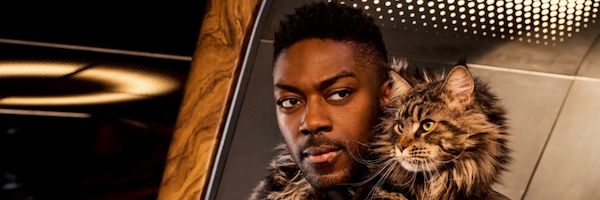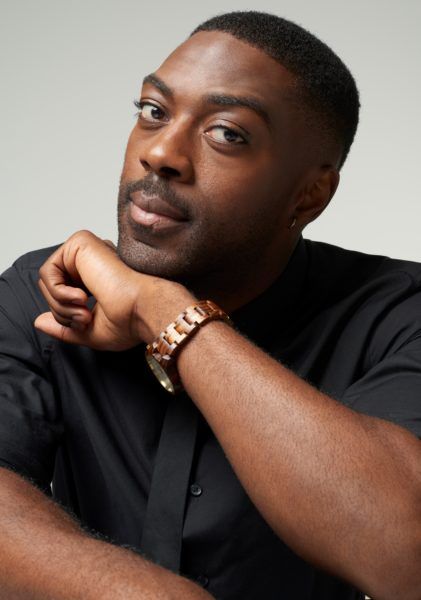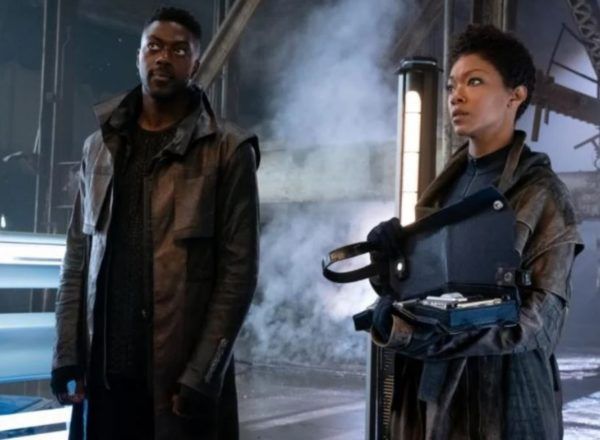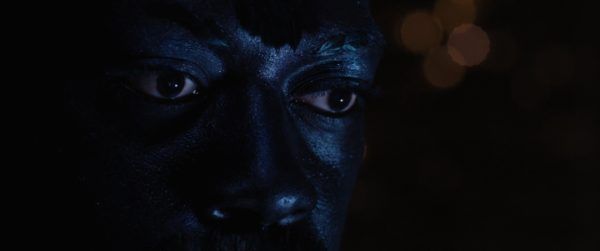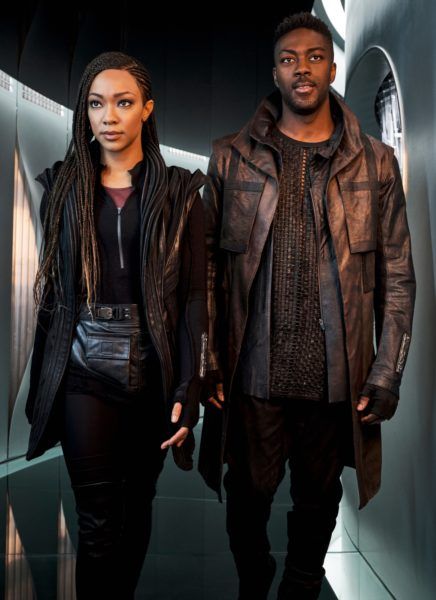The CBS All Access series Star Trek: Discovery sees Commander Michael Burnham (Sonequa Martin-Green) and the crew of the U.S.S. Discovery land in an unknown and uncertain future that’s nearly one thousand years from the home they once knew. While there, Burnham meets Cleveland “Book” Booker (David Ajala) who, along with his cat Grudge, becomes something of a guide in this unfamiliar world where they find themselves on a mission to restore hope to the Federation.
During this 1-on-1 phone interview with Collider, actor David Ajala talked about what it’s like to join the Star Trek universe, how his introduction to the franchise came out of a production of Hamlet that he was in with Sir Patrick Stewart, working with his feline co-star, the excitement of entering new territory in season 3, the physically intense fight scene he had in episode 1 with Sonequa Martin-Green, and whether he’s surprised that a world built on optimism is still so successful today. He also talked about the incredible experience he had with the Wachowskis on Jupiter Ascending, and how he’s approaching getting back into production in his own career.
Collider: I love your character and the fact that we get to meet him along with his cat.
DAVID AJALA: That is pretty cool, right? That is very cool.
How was the cat to work with? What sort of bonding experience did you and the cat have?
AJALA: Oh, plenty. Grudge is such a wonderful addition to the show and it’s great to be able to be introduced to this franchise with this special cat. Grudge’s real name is Leeu, who is a Maine Coon with a very fun, unpredictable personality. A lot of the time on set we’re not sure what version of Leeu we’re gonna get – the Leeu that’s gonna play ball or the Leeu that’s gonna be mischievous. It keeps us on our toes, which is fun, as long as it keeps everything real.
What do you think his cat says about him as a character?
AJALA: That he is an animal lover. I think there’s something quite charming about the fact that you have this guy, Cleveland Booker, who is very capable of handling himself in whatever situation. He’s used to bumping into unsavory characters, and yet he has this loyalty to this wonderful cat who he adores. There’s just something quite special about that relationship. He looks after Grudge the cat and he respects her, so much so that he calls her a queen. I love their relationship.
What’s it like to join and be a part of the Star Trek universe? When you found out that you would be joining all of that by doing this show, what did that feel like?
AJALA: It was a bit surreal because Star Trek is a show that many of us have grown up with and are enough familiar. Even if you didn’t watch the show, you’re familiar with it because it’s part of popular culture. So now, to be presented with the opportunity to be working on that show within that franchise, for me, was just something I never expected. It’s so humbling and so special to be a part of Star Trek, which has so much history. You are literally tapping into the lineage of many, many great stories which have been told around the world, and you’re joining a family which has existed even long before I was born. So, to be a part of something like that is so special, and I see more and more why a show like Star Trek means so much to fans and why it’s so important, especially in times like this. That’s quite a long roundabout way of saying it’s very, very special to be a part of Star Trek.
It’s one thing to join the world of Star Trek. It’s another to get to sit at the controls, be in control of a ship, and put on a uniform like that. What are those aspects of it like?
AJALA: Wow, that’s amazing. It’s so important to be very comfortable with the workings of how a ship operates and how to comfortably and effortlessly maneuver, not just around the ship but with the equipment. It does present fun challenges because we work with a lot of CGI and we have a lot of green screens. It’s so important that, as the actors, we really fill our minds with as much story as possible, so that we can really see these images that we’re looking at and we can really see that spaceship, that alien and that explosion. Working on this show, as an actor, is literally being given an invitation to explore the depth of your imagination in space.
You’ve previously talked about how your introduction to Star Trek came at the recommendation of Sir Patrick Stewart, when you had worked with him. What was it like to do Hamlet with Sir Patrick Stewart and David Tennant? What do you learn from doing a production like that?
AJALA: It was amazing. One of the things that I definitely learned from them was that there’s something to be said about the history of performance and acting. Acting, essentially, is about storytelling and characters telling their stories and sharing their stories. With theater, there’s something very special about how it takes you to the origin of performance. I believe that on the stage is when an actor really learns their craft and is able to hone in on their craft. So, working with two accomplished actors like Sir Patrick Stewart and David Tennant, and seeing them on screen but then also seeing them on stage, it really allowed me to appreciate their artistry because they were equally as brilliant on screen as they were on stage. It was absolutely amazing.
You’ve done quite a variety of sci-fi and fantasy projects that have all been very different in the stories that they’ve told. Was that something that you were specifically attracted to, or did you not even realize that you were amassing all of these genre credits?
AJALA: Honestly, I had no intention of going in any specific direction. I usually base my projects upon the character and what story that character is telling. It just so happens that over the past few years, most of my work has gravitated towards science fiction. That’s just been purely coincidental but so much fun at the same time.
You were also in Jupiter Ascending, which people have been strongly divided about since it came out. What do you remember about making that film and working with Wachowskis?
AJALA: The Wachowskis are seriously talented and great to collaborate with. There’s always something very exciting when you work with someone who has the intention to just push the boundaries and to reinvent themselves and ideas, which can easily become recycled. There’s something about the Wachowskis that I just love. There is no limit to their imagination and that passion is infectious on set. I have memories of being in Chicago and shooting this massive sequence with Channing Tatum and Mila Kunis, and just looking around and taking it all in. I had a moment of, “Wow, we’re actually doing this. We’re doing this together. We’re literally doing things that haven’t been done before.” There’s something exciting and scary about that, at the same time.
The Wachowskis feel like filmmakers and storytellers who are very much ahead of their time, and even if we don’t always fully understand what they’re doing, you can absolutely appreciate the chances and risks that they take.
AJALA: Absolutely! Thank you for saying that and articulating it so much better than I did. They are ahead of that time. When I had that moment on set with Channing Tatum and Mila Kunis, when I looked around and thought, “Wow, we’re doing this,” that response, on the back of being familiar with the script and just seeing how ahead of their time they really are, was very impressive.
Your character on this season of Star Trek: Discovery is this very interesting bridge between the past, where these familiar characters are coming from, and the future, which is his present. Even though you’re the new guy to the show this season, the previous cast of characters are also the new guys in his world. What has it been like to have that balance to explore?
AJALA: Yeah, there’s something quite brilliant about hearing that, actually. I’ve never thought about it like that but it’s so true. There is something exciting about going into new territory, and we’re going a thousand years into the future. Cleveland Booker is the gatekeeper to that new future. He’s gonna take the viewer, as well as Michael Burnham, into the new future. But the Discovery crew are new to this world. It’s a weird juxtaposition of having two sets of people who are going on similar journeys but who are new to each other. There’s something quite cool about that. It just means that we’re forced to find our identity, individually and collectively. This whole season is about finding your identity in unfamiliar territory.
What did you enjoy about playing the dynamic between Cleveland Booker and Michael Burnham, and having Sonequa Martin-Green to play that with, especially with her now in her third season of the show?
AJALA: First, Sonequa is just a wonderful person to be around and she’s a great talent. What’s fun is how different these characters are but yet they’re thrown into a situation where they have to be reliant on each other. Sometimes situations like that can forge some of the best relationships. You’ll see that episode 1 of season 3 really sets these guys up to hopefully bring out the best in each other.
How much were you told about what the journey would be this season, for your character specifically? Did you know much about where it would all go going into it, or did you have to learn as the episodes went on?
AJALA: I was really tempted to know the details of the full season. I really wanted to just know as much information as possible. But then, at the same time, I think there’s something important about leaving room for discovery and learning, so that’s what I tried to do. I did try to leave some questions unanswered because I think, especially for my character and his journey, and for the way that I work, there’s a lot more fun in discovering without knowing where exactly you’re going to next. I like the idea of not knowing the future.
Very early in your introduction, you got to have a very physical fight scene. What was it like to shoot that? How long did it take to shoot and were there any specific challenges in shooting that?
AJALA: One of the challenges with a sequence like that is that usually when you’re filming it, you film it in three parts, but because we were tight for time. we had to shoot that fight sequence as a oner. But because Sonequa and myself were so well-rehearsed, it just meant that we could do it in a oner, over and over and over again. At the end of that day, we were knackered. That was challenging but fun. It was so much fun but challenging. That’s one of the reasons why, when you’re doing a show like Star Trek, especially if you’re doing a lot of stunts, it’s important to be as fit as you can.
It’s an awesome hands-on fight scene and a fun way to introduce the relationship between those characters.
AJALA: I agree. Absolutely. And it was not only a fun way to introduce that relationship but it allows you to really see the journey of these two individuals who, when we first meet them, end up having a big fight. So, throughout the season, when we’re seeing their relationship develop, we’re always gonna remember how they initially met. I think that’s gonna be very fulfilling and fun for the viewers to see.
How have you found the experience of working with this entire cast, not just of diverse and very different actors, but very different characters and species and creatures?
AJALA: There’s so much variety. One of the fun things is, when you read the script and then you go shoot it, you arrive on set and you know the scenes that you’re gonna do, and you’ve pictured how the world will look and what characters you’re gonna meet and how the aliens are gonna look, and it’s just so cool to see these ideas being realized and to see these different species, and how much effort and work goes into not just the costumes and the prosthetics but the presentation of the world and the characters. It’s really, really impressive. It just reminds us how passionate our crew are. The crew and the guys who work behind the scenes put their blood, sweat and tears and passion into the work. They really do. To see it all come together is really exciting.
Are you surprised that a world that’s built on optimism and a positive outlook can still find its place in our current world, or do you think that it thrives because of everything going on around us?
AJALA: That’s a good question. I think it’s a bit of both. Sometimes the pendulum swings a little more in one direction but now, through times like this, where there’s so much going on in the world and there’s a lot of uncertainty, we’re literally trying to understand things a little more and show more empathy towards each other and, at the same time, we’re trying to support each other. We’re all in this situation now where we’re not only interconnected but we’re relying on each other. Every individual plays their part. Because of COVID-19, as much as the scientists and biochemists and various different departments are trying to find a vaccine, it’s also our responsibility to play our part, so that we can help in the grand scheme of things. I can’t remember a time where we have all been enlisted to be responsible and think about our neighbor. The moral of love thy neighbor has never rung so true before. So, when you have a show like Star Trek, which represents so much optimism and light, it shows and reminds us of why this show has been around for so many years. Effortlessly, it’s able to share social commentary and challenge our thinking and hopefully empower our thinking.
How are you approaching working now in this world that we’re currently living in?
AJALA: It’s gonna require a really good attitude of playing ball, being able to adapt, and then just embracing this new normal, and still trying to have fun and create within this new normal. Just because we’re going through a transitionary period, it doesn’t mean that creativity has to be stifled. I think we should all just embrace the challenge, as best we can, and with that challenge, allow it to bring out the best in us and our work. It forces us to be more creative, to find more creative ways of filming a sequence with less people in it because you wanna try, as much as possible, to implement social distancing. That can be a fun challenge sometimes. Sometimes it’s annoying and just a straight up challenge, which can be tough, but nonetheless, I think we should all be up for it. Hopefully, it’ll bring out the best in us.
Have you gone into production on anything yourself?
AJALA: I’m gonna be prepping to do a gig soon, so it’s gonna be interesting to be on set and to see how that works. I’ve spoken with a few of my friends and they’ve explained to me what the situation was like for them, returning back on set, which has been helpful. It’s good to have somewhat of an understanding but I know I’ll have a more in depth understanding once I’m physically on set and navigating my way around all of that. Wish me luck.
Star Trek: Discovery is available to stream at CBS All Access.
Christina Radish is a Senior Reporter of Film, TV, and Theme Parks for Collider. You can follow her on Twitter @ChristinaRadish.

